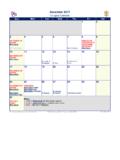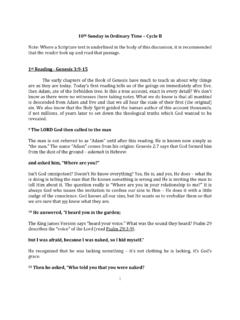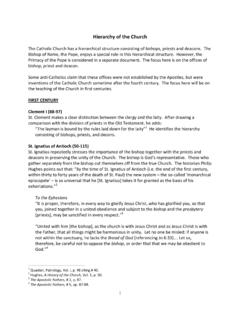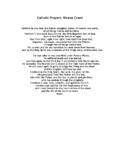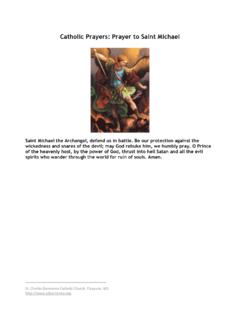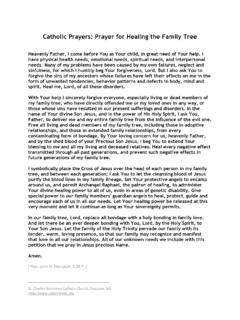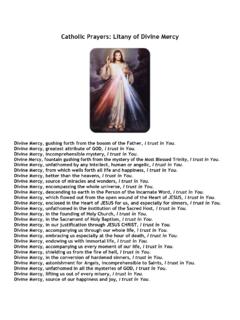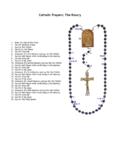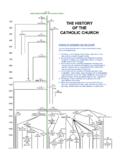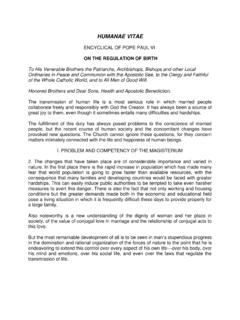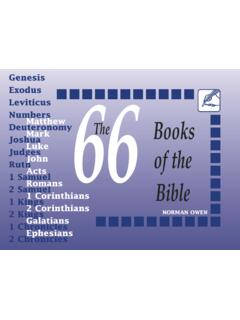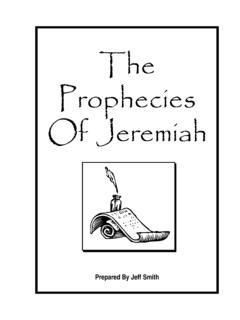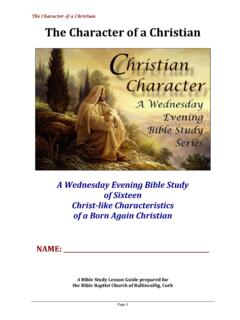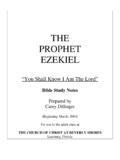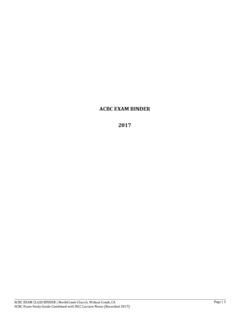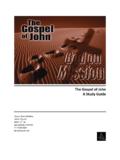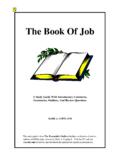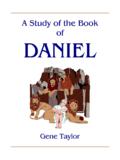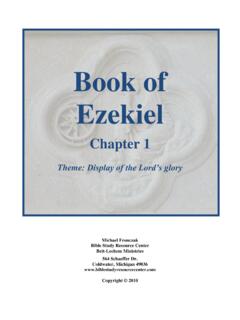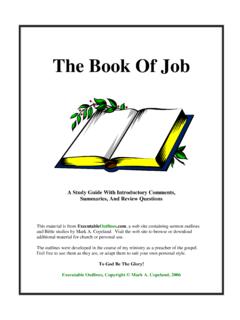Transcription of 11th Sunday in Ordinary Time - Cycle B
1 1 11th Sunday in Ordinary time Cycle B Note: Where a Scripture text is underlined in the body of this discussion, it is recommended that the reader look up and read that passage. 1st Reading - Ezekiel 17:22-24 In the history of Judah there were three deportations to Babylon: in 605, eight years later in 597, and again eleven years later in 586. All three deportations were carried out by Nebuchadnezzar, king of Babylon. The first deportation took place while Jerusalem was under siege and included the young prophet Daniel. During another siege of Jerusalem, King Jehoiachin and about ten thousand men, especially soldiers and metal workers were deported in what became known as the second deportation; Ezekiel was among the captives. When Jerusalem fell in 586, all the people of Judah, except the poorest of the land and those who had escaped to neighboring countries, were carried away. Ezekiel, whose name means God strengthens, was of priestly stock, probably a member of the house of Sadoc, and himself a priest.
2 He was married, but does not seem to have had any children. In Babylon he lived in his own house, the exiles of this period having been allowed to take their families and the moveable possessions with them. The exiles, although comfortable, were painfully aware that they were captives. They were cut off from the Temple. They felt that their ancestors had offended Yahweh but that His anger would soon be appeased and then they would return to their own land. Ezekiel received his prophetic calling in 593 (four years after his deportation) and his first duty was to convince his fellow exiles that their expectation of an early return was in vain; as was their faith in the inviolability of the Temple. Yahweh had decreed the destruction of Jerusalem and the Temple and the dispersion of the people of Judah. A fact which came to pass seven years later. The fall of Jerusalem demonstrated the truth of Ezekiel s prophetic mission; now Ezekiel had to drive home the all-important truth that the people were not suffering for the sins of their forefathers, but for their own sinfulness.
3 If a man truly repents, he will be saved. With the Temple destroyed, the people were crushed and humiliated, they were on the verge of despair. Ezekiel offered words of comfort and hope. It is of this hope that we hear today as the sacred author uses a literary tool known as an A-B-A sandwich; a device which uses two allegories (an allegory is a literary composition in which each detail signifies some reality) to bracket the interpretation. In this case, Chapter 17 is the entire sandwich with verses 1 through 10 (the allegory of two eagles) forming one side, verses 11 through 21 being the interpretation, and our reading (verses 22 through 24) being the second allegory. To better understand the reading, we will read through the entire A-B-A sandwich. 2 First Allegory 17:1 Thus the word of the LORD came to me: 2 Son of man, propose a riddle, and speak this proverb to the house of Israel: 3 Thus speaks the Lord GOD: The great eagle, The great eagle is Nebuchadnezzar.
4 With great wings, with long pinions, with thick plumage, many-hued, came to Lebanon. Lebanon is an image for Israel, particularly Jerusalem (see jeremiah 22:6; Zedekiah 11:1-3; Isaiah 10:34). He took the crest of the cedar, 4 tearing off its topmost branch, The topmost twig is Jehoiachin, king of Judah, who was taken into captivity with Ezekiel (2 Kings 24:8-15). And brought it to a land of tradesmen, set it in a city of merchants. Babylon 5 Then he took some seed of the land, and planted it in a seedbed; The seed represents Zedekiah, Jehoiachin s uncle, who was named king in his place (2 Kings 24:17-18). A shoot by plentiful waters, like a willow he placed it, 6 To sprout and grow up a vine, dense and low-lying, Its branches turned toward him, its roots lying under him. Thus it became a vine, produced branches and put forth shoots. The willow and vine are references to something which grows rapidly.
5 Those of us in the south can associate kudzu with this same phenomenon. 7 But there was another great eagle, This great eagle is Pasammetichus II of Egypt; with whom Zedekiah had made a covenant to help lift the Babylonian attack in 588 ( jeremiah 37:4-11). great of wing, rich in plumage; To him this vine bent its roots, sent out its branches, That he might water it more freely than the bed where it was planted. 8 In a fertile field by plentiful waters it was planted, to grow branches, bear fruit, and become a majestic vine. 9 Say: Thus says the Lord GOD: Can it prosper? Will he not rather tear it out by the roots and strip off its fruit, so that all its green growth will wither when he 3 pulls it up by the roots? (No need of a mighty arm or many people to do this.) 10 True, it is planted, but will it prosper? Will it not rather wither, when touched by the east wind, in the bed where it grew? The east wind is the desert sirocco, a hot drying wind that withers crops.
6 It is a metaphor for God s anger (Exodus 10:13; 14:21; Psalm 78:26). This instrument of wrath was Nebuchadnezzar. Zedekiah was a weak king who had been appointed by Nebuchadnezzar when Jehoiachin was exiled. Zedekiah was caught between the king of Babylon to whom he had sworn a covenant of alliance (2 Chronicles 36:13) and the king of Egypt to whom he had appealed for help. Both Ezekiel and jeremiah spoke of the allegiance which Zedekiah owed to Nebuchadnezzar ( jeremiah 27:1-7). Interpretation 11 Thus the word of the LORD came to me: 12 Son of man, say now to the rebellious house: Do you not understand what this means? It is this: The king of Babylon came to Jerusalem and took away its king and princes with him to Babylon. 13 Then he selected a man of the royal line with whom he made a covenant, binding him under oath, while removing the nobles of the land, 14 so that the kingdom would remain a modest one, without aspirations, and would keep his covenant and obey him.
7 15 But this man rebelled against him, sending envoys to Egypt to obtain horses and a great army. Can he prosper? Can he who does such things escape? Can he break a covenant and still go free? 16 As I live, says the Lord GOD, in the home of the king who set him up to rule, whose oath he spurned, whose covenant with him he broke, there in Babylon I swear he shall die! 17 When ramps are cast up and siege towers are built for the destruction of many lives, he shall not be saved in the conflict by Pharaoh with a great army and numerous troops. 18 He spurned his oath, breaking his covenant. Though he gave his hand in pledge, he did all these things. He shall not escape! These verses emphasize why Ezekiel considers Zedekiah s rejection of Babylon so wrong: he has broken a solemn covenant with Nebuchadnezzar a covenant sworn before God. 19 Therefore say: Thus says the Lord GOD: As I live, my oath which he spurned, my covenant which he broke, I swear to bring down upon his head.
8 20 I will spread my net over him, and he shall be taken in my snare. I will bring him to Babylon and enter into judgment with him there over his breaking faith with me. 21 All the crack troops among his forces shall fall by the sword, and the survivors shall be scattered in every direction. Thus you shall know that I, the LORD, have spoken. The accusation continues but with the third-person description becoming a first-person speech of God. The covenant is no longer seen as between Zedekiah and Nebuchadnezzar, but between Zedekiah and God, since the covenant was sworn using God s name. It is God who brings the judgment; even though He will use Babylon as the instrument of 4 punishment Second Allegory 22 Therefore say: Thus says the Lord GOD: I, too, will take from the crest of the cedar, from its topmost branches tear off a tender shoot, And plant it on a high and lofty mountain; 23 on the mountain heights of Israel I will plant it.
9 The tender shoot represents a future king from the house of David (2 Samuel 7:13). Nazareth (from nezer, meaning shoot or branch) is the shoot of Jesse (Isaiah 15:1). Jesse was the father of King David. It shall put forth branches and bear fruit, and become a majestic cedar. Birds of every kind shall dwell beneath it, every winged thing in the shade of its boughs. The birds hearken back to the story of Noah s ark (Genesis 6:20) where the term is part of the description of all living things. 24 And all the trees of the field shall know that I, the LORD, Bring low the high tree, lift high the lowly tree, Wither up the green tree, and make the withered tree bloom. As I, the LORD, have spoken, so will I do. The majestic cedar of the preceding verse is the symbol of the royal house of Judah. If this majestic cedar is the King of Judah, the trees of the field are the surrounding kings and they will know that God humbles the mighty and raises up a new power from nothing.
10 God brings up a new king of the Jews to rescue them from the lowly state of punishment to which Judah has fallen. The cedar is the messianic tree of David. 2nd Reading - 2 Corinthians 5:6-10 Saint Paul now continues our reading from last week by teaching about our heavenly dwelling which is our ultimate destination and how we are to work to achieve it. 6 So we are always courageous, although we know that while we are at home in the body we are away from the Lord, This earthly tent we occupy is not our home; our home is in heaven. We are just passing through this place. We are shown in other places (Acts 16:16-40; 22:22-29; Romans 13:1-7; 2 Thessalonians 3:6-13; Ephesians 4:28) that just because we are not with the Lord now, doesn t mean that we shouldn t concern ourselves with building up the earthly city. We who in this world are away from the Lord walk about on earth, it is true, but we are hastening on our way to heaven.
